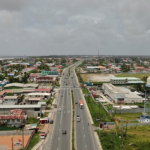
With Guyana’s 4th Round of Mutual Evaluation by the Caribbean Financial Action Task Force (CFATF) due within months, the Cabinet has approved a National Policy and Strategy for Combating Money Laundering, Terrorism Financing, and the Financing of Proliferation, with the aim of preventing, detecting and supressing money laundering and related offences in keeping with international standards.
The just approved National Policy and Strategy is intended to combat money laundering and serious offences linked to money laundering, by carrying out effective preventative measures, intelligence sharing, enforcement efforts and sanctioning in line with international standards through national cooperation and the strengthening of the legislative framework.
The five-year plan also aims to further enhance and improve Guyana’s AML/CFT/PF regime by addressing the risks identified in Guyana’s Second National Risk Assessment (NRA) Report and implement the strategy in conjunction with Guyana’s Risk Based Action Plan.
The policy covers a range of government agencies and private sector entities including the Attorney General’s Chambers, the Chambers of the Director of Public Prosecution, the Financial Intelligence Unit, the Guyana Police Force, Department of Energy, the Guyana Revenue Authority, commercial banks, insurance companies and brokers, money transfer agencies, credit unions and security companies among others.
Explaining that money laundering and its related crimes could have a negative impact on the economy, the Government, in the policy document, said these reprehensible crimes directly and indirectly contribute to the erosion of the rule of law, threatens political instability, encourages corruption and weakens the financial sector.
“An increase in these crimes could result in a loss of confidence in a country’s financial system and the institutions that are necessary for good governance,” it added.
The Government said it is therefore imperative to have a strong legal regime in place in order to provide law enforcement agencies and prosecutors with sufficient legal powers and tools to detect and disrupt criminals and terrorists’ activities by bringing perpetrators to justice, and depriving them of their assets through fines, confiscation and asset recovery.
According to the most recent National Risk Assessment Report, Guyana’s money laundering risk is “Medium High”, as its threats and vulnerability levels are also medium high.
“It was also noted in Guyana’s Second NRA Report that Guyana is a transit country for cocaine destined to North America, Europe, West Africa and the Caribbean because of its unique geographical location. Guyana shares borders with Venezuela, Brazil and Suriname and most of these borders are situated in the hinterland region which is heavily forested. Particularly, Venezuela is known to be politically unstable and a transhipment point for illicit drugs. Cocaine originating in Colombia is smuggled to Venezuela and then to Guyana by sea or air,” the Government explained.
The Attorney General and Minister of Legal Affairs, Anil Nandlall anticipates that the implementation of the National Policy and Strategy will not only bring Guyana in compliance with international obligations but will be the menu of organised strategic and targeted actions that will create a robust and resilient protective network, that will insulate Guyana and its financial system from being contaminated by the proceeds of crime.
In the past, Guyana was successfully removed from FATF’s Grey List after making significant changes to its legislative frame work. Its 4th Round of Mutual Evaluation is due in the second quarter of this year.
In the coming weeks, the Government is expected to introduce amendments to the Anti-Money Laundering and Countering the Financing of Terrorism Act with the aim of addressing the gaps identified by the Regional Security System (RSS).











You must be logged in to post a comment Login